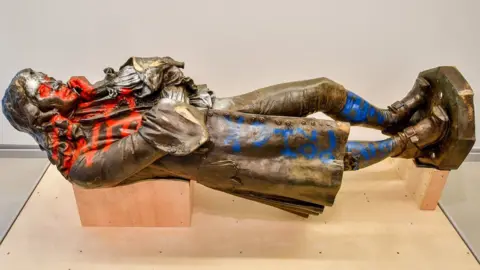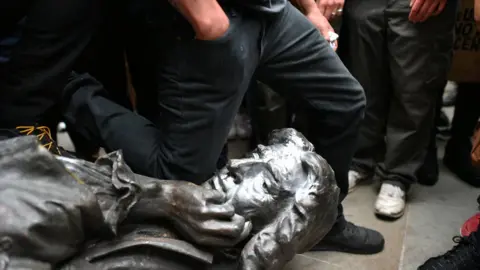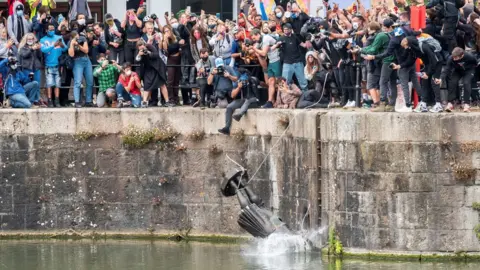Edward Colston: Statue could formally move into M Shed Museum
 PA Media
PA MediaA proposal to formally move the statue of transatlantic slave trader Edward Colston into a museum display is set for approval.
The Grade II listed statue was pulled down during a protest in Bristol in 2020 before being put on a temporary display at the city's M Shed Museum.
It has been out of public view since January 2022 - but could return to the M Shed if the plan is agreed.
The Mayor of Bristol says the "best place for the statue is in a museum".
According to the plans, the Grade II listed plinth would remain on Colston Avenue and a new plaque is also proposed.
The planned move comes after a city-wide survey conducted by the We Are Bristol History Commission found that 80% of Bristolians agreed with the statue being placed in a museum.
The statue would feature as part of the M Shed's upcoming exhibition centred around the theme of protest, which will open next month.
Bristol City Council's development control committee is expected to vote on applying for the de-listing of the statue on 21 February in order to move it from its plinth to the M Shed.
'Many diverse opinions'
Mayor of Bristol Marvin Rees said: "I remain in support of the view that the best place for the statue is in a museum where its context, and that of what it represents to many communities can be appropriately shared with diverse audiences."
Professor Tim Cole, who chaired the We Are Bristol History Commission, and was one of the academics to produce the report, said: "That project saw us gather many diverse opinions and views that truly demonstrated the complexity of the feelings associated with the statue and the many strands of context associated with it.
"What was clear though, despite the many different views shared, was an overwhelming sense that people saw the museum as being the best place for the statue and I am pleased to see the council acting on this recommendation."
According to a council report, Bristol City Council Conservation said a statue of Colston remaining on the plinth was "not a reasonable expectation" due to a potential focus of "civil unrest".
 PA Media
PA MediaThe statue of the prominent 17th Century slave trader was torn down by protesters using ropes in the first summer of the coronavirus pandemic during a wave of anti-racism marches across the UK.
Colston was a member of the Royal African Company, which transported about 80,000 men, women and children from Africa to the Americas.
Nearly 100,000 people visited "The Colston Statue: What next?" temporary display in 2021 in the M Shed.
 Reuters
Reuters
Follow BBC West on Facebook, X and Instagram. Send your story ideas to: [email protected]
